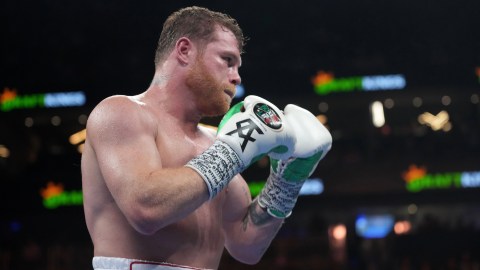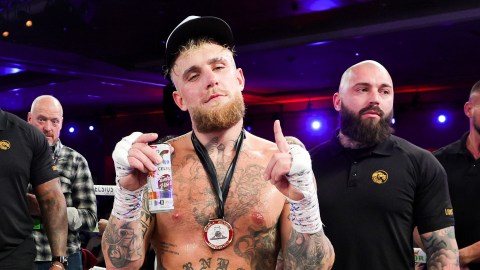Watching the first two fights of Showtime's Super Six tournament on Saturday was fun but a little frustrating. I saw so much Saturday night: great boxing, fantastic crowds and an amazing KO — but I also saw people being betrayed.
If you are like me and thought Andre Dirrell won that fight, you are a little perturbed about the decision. I'm here to tell you Dirrell wasn't betrayed by the judges, he wasn't betrayed by the fans or the ref — he was betrayed by his management team. The same way Jermain Taylor was betrayed by his past. The fans were betrayed by the sport again not getting it right, and therefore the tournament betrayed boxing by not fully living up to it's potential (Are you still following me?).
Jermain Taylor (28-4, 17 KO) vs. Arthur Abraham (31-0, 25 KO)
The tension after fifth round of the Jermain Taylor-Arthur Abraham fight was as thick as a Boston accent. Everyone knew coming in that Abraham was going to start slow and that Taylor may be able to stack up a few points because of it. Taylor seemed disciplined, focused and very respectful of Abraham's ability as a fighter (mostly his power). He was using his jab, moving, and as it seemed to me, reserving his energy so that he could avoid falling apart at the end.
Abraham was up to his usual self: hands high absorbing shots and consistently moving forward like a panzer absorbing the enemies' ammunition and waiting for it to run out. I think everyone knew at some point he was going to open up, start firing bombs, and leave tread marks on the opposition (that's it for the tank analogies, I promise).
In the fifth round, Abraham started letting his hands go. By the sixth round it seemed like it was time for Taylor to return fire, the same way he did early in the first Kelly Pavlik fight and the Carl Froch fight. Taylor just kept pawing with the jab and moving to his left, which made me think: 'OK, he's just making sure he's got enough gas in the tank for later.' It's understandable with the issues he's had in the past, but the scorecards were evening up very quickly.
Taylor seemed so afraid of running out of gas that he wasn't willing to throw with 'bad Intentions.' I feel Taylor was haunted by his past. If he hadn't run out of gas so many times before, would he have put more on his punches? Could he have taken more steam out of Abraham, so perhaps that right in the 12th wouldn't have had so much on it? Did he fight scared? The answers no longer matter. Taylor's past caught up with him Saturday night and it may be a warning, just like old Marley to Ebenezer: it's time for a change.
Andre Dirrell (18-1, 13 KO) vs. Carl Froch (26-0, 20 KO):
This fight was not easy to watch at times and yet still entertaining. Froch was the older, grizzled champion taking on the young lion looking to make a name for himself. It was quite obvious from the start that Dirrell had twice the athletic ability of Froch. The question was: could he box as well? The answer was yes. He out-boxed Froch for most of the fight and even held his own under the pressure of Froch's dirty tactics. I don't blame Froch for getting rough. He did what he had to do.
I don't fully blame the judges for giving Froch the fight, after all Dirrell ran and held quite a bit in this fight, I might even say he was wimpish. I don't even blame Dirrell; this is by far the biggest fight of his career. I blame Dirrell’s management for him losing this fight. A guy like Dirrell, with a bronze medal and boat loads of God given athletic ability, should have stepped up his game well before this fight.
You could see Dirrell gain confidence towards the end of the fight; he started to sit down on his punches, and stand up to Froch's reckless aggression. Dirrell seemed to realize what we all realized from the first round: he was a better fighter than Froch. That is something he would have known from the start, had he already been accustomed to fighting at this level. In the end it was poor planning on team Dirrell that betrayed him. Had Dirrell faced a top ten Super-middleweight prior to his Froch fight, I feel the outcome in Nottingham would have been very different. It wasn’t the decision that was bad, it was the decision to not step up his competition sooner that was no good!
Showtime
One of my major problems with boxing has always been that the judges in a boxing match are paid by the promoter of the event — not directly, but that is where the money comes from. Imagine if the NFL refs were hired by the home team? What if all Olympics judges were paid by the host country? What would baseball be if the pitcher paid the umpires?
Sometimes in big fights the promoter even pays for the hotel and other expenses of the judges. 'Don't bite the hand that feeds you' is the term, isn't it?
Showtime put together a one-of-a kind tournament, something that could help boxing in the long run. They did something that no one else is doing; put the best against the best, with no exceptions. If they wanted this done right, they should have taken the promoters control over judges and refs out of the equation. Showtime should have been the ones signing the checks and picking the judges, or at least making sure it was someone other than the promoter. After all, the network put this together, put up the money, and is giving these guys huge amounts of exposure. A few bad decisions in the tournament and the whole thing could be tarnished. That means future tourneys won't make the same money, and Showtime Boxing will still be viewed as the lesser of HBO.
This is a tournament that could do wonders for the sport of boxing. If it is successful we could see this happen again with other divisions, or even better, all the divisions. Could boxing go to a World Cup, or US Open type format? What if every year boxing was set up as a series of tournaments to find the champions in every division? Wouldn't that get boxing back on top? Not if TV networks don't demand that something else happens with payment of the judges and refs. Perhaps both promoters split the cost of judges and refs and an intermediate like the network pays them?
I don't solve problems, I just question them.
In closing, the great thing about this tournament is whether the decision was correct or not. The boxers and the public move on. I don't have to read about people clamoring for a rematch that will never happen. Instead it feels more like regular sport, where people argue over the outcome and move on to the next game. Don't you like that feeling?
It may have seemed as if I didn't enjoy the first two fights with all my ranting and raving, but I did very much. As much as boxing has burned me and fans like me, I will never abandon or betray it, because when it all comes together just right, it is the greatest sport in the world. Bring on Ward vs. Kessler and Group Stage Two!
Bryan blogs regularly at bryguyboxing.blogspot.com.



